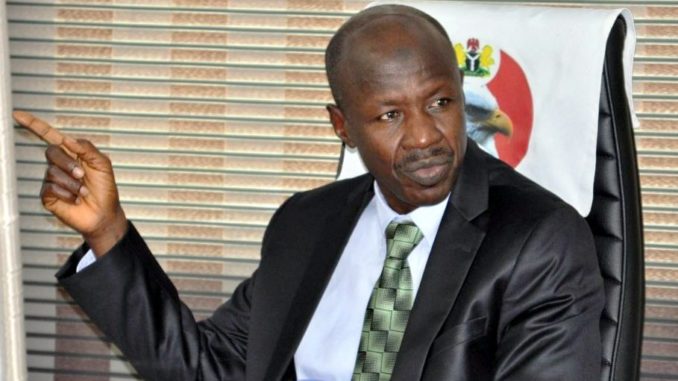
Lagos—The Economic and Financial Crimes Commission, EFCC has said that the Court of Appeal judgment on prosecution of serving judges will not stand.
The Court of Appeal sitting in Lagos, yesterday, had held that the Economic and Financial Crimes Commission, EFCC, does not have powers to investigate or prosecute serving judicial officers, except where such officers had been dismissed by the National Judicial Council, NJC.
Ibrahim Magu, EFCC boss
Consequently, it struck out the charges brought against a serving judge of the Bayelsa Division of the Federal High Court, Justice Hyeladzira Nganjiwa, by the EFCC.
The EFCC had arraigned Justice Nganjiwa before a Lagos State High Court sitting in Igbosere, for allegedly receiving $260,000 and N8.65 millon gratification to enrich himself as a public official.
In the beginning
EFCC had on June 23, 2017, arraigned the Judge on a 14-count charge before the high court.
Justice Nganjiwa had pleaded not guilty and trial commenced before Justice Adedayo Akintoye.
He had also earlier argued that the anti-graft agency has no powers to prosecute him.
Justice Nganjiwa’s counsel, Chief Robert Clarke, SAN, challenged Justice Akintoye’s jurisdiction to entertain the matter.
Clarke had before Justice Nganjiwa’s arraignment on June 23, argued a preliminary objection challenging Justice Akintoye’s jurisdiction to hear the case.
He had contended that by virtue of Section 158 of the 1999 Constitution, only the National Judicial Council, NJC, has the powers to deal with the kind of allegations brought by the EFCC against his client, a serving judge.
But the EFCC’s counsel, Mr Rotimi Oyedepo, disagreed and rather maintained that despite being a serving judge, Justice Nganjiwa does not have immunity against criminal prosecution.
“We must be bold enough to concede that the NJC has administrative powers in the appointment and administrative discipline of a judicial officer.
‘’But Section 158 of the Constitution did not clothe the applicant with immunity from criminal trial.
“While what the act complained about can amount to misconduct that can weigh on the mind of the NJC in recommending the removal of the applicant from office, that same misconduct that has constituted an offence in Lagos State is still liable to be determined by this court,” Oyedepo had argued.
In her ruling, Justice Akintoye of the lower court upheld Oyedepo’s argument and dismissed Justice Nganjiwa’s objection.
The appeal
Consequently, Justice Nganjiwa went on appeal.
Delivering judgment, yesterday, the Appeal Court in its judgment by Justice Adele Obaseki, quashed the 14-count charge filed against Justice Nganjiwa, upturning the judgment of the lower court.
The appellate court held that the EFCC does not have the powers to investigate or prosecute serving judicial officers except where such officers had been dismissed by the National Judicial Council, NJC.
EFCC to appeal ruling
Meanwhile, the EFCC will appeal against the ruling of the Lagos Division of the Court of Appeal, which ruled that the agency lacked powers to investigate or prosecute serving judicial officials except where such officers have been dismissed by the NJC.
A statement by its spokesman, Wilson Uwujaren, said the ruling was dangerous and baseless, having no basis in law.
“The commission considers the ruling a dangerous precedent that has no basis in law and is confident that the Supreme Court will upturn the judgment.
“Criminal trial takes precedence over administrative procedures and it is strange that the Court of Appeal wants to put the cart before the horse. This is ridiculous! The appellate court simply wants to confer immunity on public officers from prosecution for corruption.
“It will not stand,” EFCC said.
END

Be the first to comment